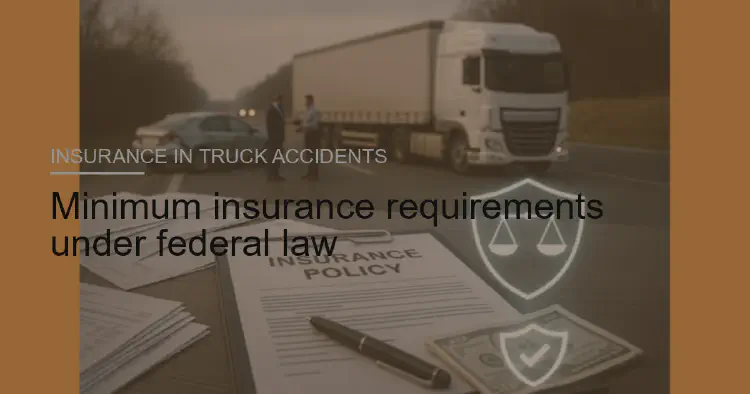Minimum insurance requirements under federal law
To ensure that victims of truck accidents can be compensated for damages, federal law mandates minimum levels of insurance coverage for all commercial carriers engaged in interstate commerce.
- Truck Accident Law Team
- 2 min read
Article 2 of 6 in Insurance in Truck Accidents/

Minimum Insurance Requirements Under Federal Law
Governing Authority
- The Federal Motor Carrier Safety Administration (FMCSA) sets the financial responsibility standards for trucking companies.
- Requirements apply to carriers operating in interstate commerce and those transporting hazardous materials.
Current Minimum Coverage Amounts
-
General Freight (Non-Hazardous Cargo)
- Trucks over 10,000 pounds must carry at least $750,000 in liability coverage.
- Many carriers voluntarily carry $1,000,000 or more due to high accident costs.
-
Oil Transport
- Minimum coverage of $1,000,000.
-
Hazardous Materials (HazMat)
- Minimum coverage of $5,000,000 due to the extreme risks posed by toxic, flammable, or explosive cargo.
-
Passenger Carriers (Buses)
- Coverage depends on seating capacity:
- $1,500,000 for vehicles seating 15 or fewer passengers.
- $5,000,000 for vehicles seating 16 or more.
- Coverage depends on seating capacity:
Purpose of Federal Requirements
- Protects the public by ensuring that carriers have sufficient resources to cover accident damages.
- Promotes accountability and discourages unsafe operators from entering the industry.
Criticism and Reform Discussions
- Critics argue that the $750,000 minimum for general freight is outdated, set in the 1980s, and does not reflect today’s medical costs and inflation.
- Safety advocates push for significantly higher minimums to ensure victims receive full compensation.
Legal Relevance
- If a carrier lacks required insurance, it may face fines, loss of operating authority, and increased liability exposure.
- Insurance minimums often determine the baseline settlement value in truck accident claims.
Summary: Federal law requires trucking companies to maintain substantial insurance coverage, with amounts ranging from $750,000 to $5,000,000 depending on cargo and vehicle type. These minimums ensure financial responsibility, but ongoing debates question whether they remain adequate for modern accident costs.
You might also like:
- Tags:
- Trucking Companies
- Hazardous Materials
- Insurance Coverage
- Federal Law
- Medical Costs
- Liability Coverage
- Safety Administration
- Accident Claims
- Insurance Requirements
- Insurance Minimums
- Settlement Value
- Legal Relevance
- Ensure Victims
- Liability Exposure
- Administration Fmcsa
- Carrier Safety
- Federal Motor
- Motor Carrier
- Victims Receive
- Interstate Commerce
- Truck Accident Claims
- Carrier Safety Administration
- Federal Motor Carrier
- Motor Carrier Safety
- Safety Administration Fmcsa
- Hazardous Materials Hazmat
- Ensure Victims Receive
- Coverage Hazardous Materials
- Trucking Companies Maintain
- Loss Operating Authority
- Authority Federal Motor
- Minimum Insurance Requirements
- Federal Law Requires
- Settlement Value Truck
- Value Truck Accident